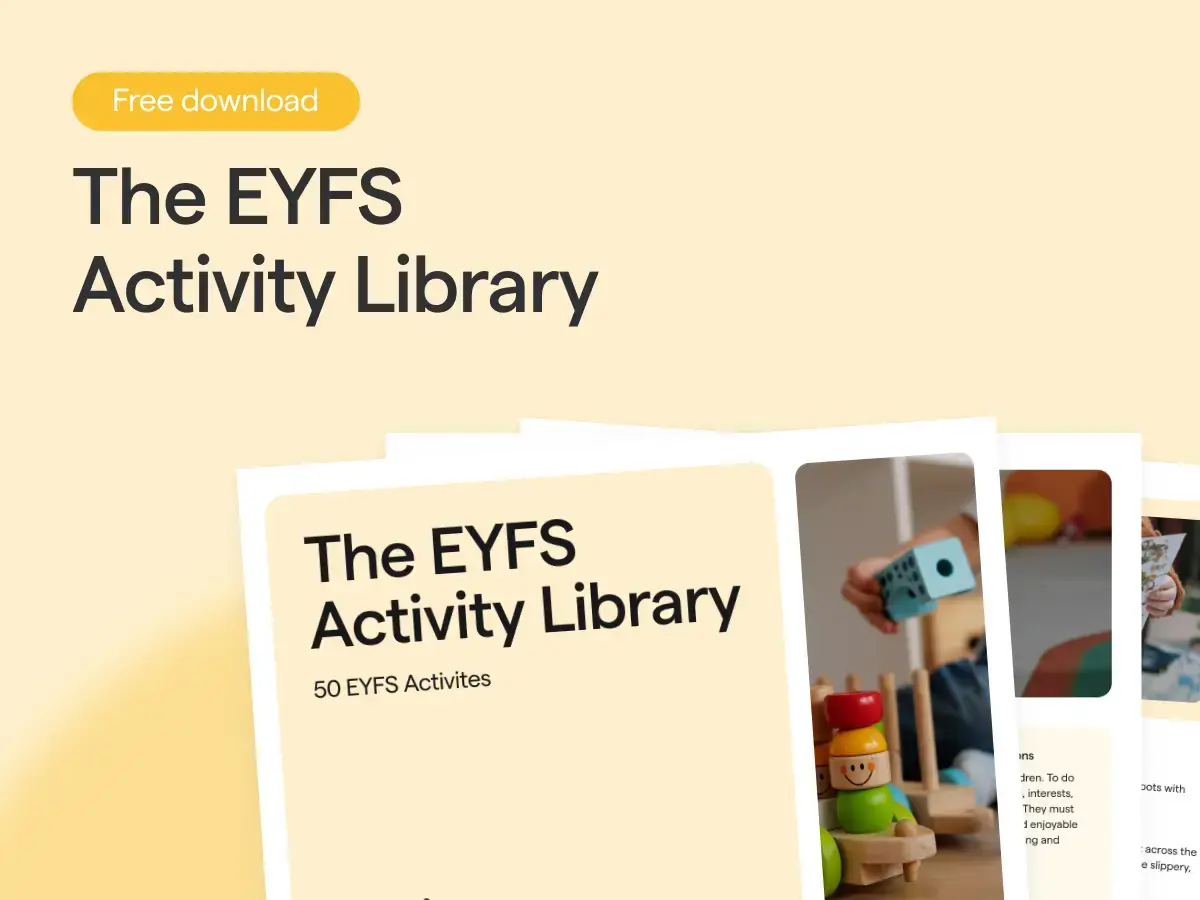settings
children
With Famly since
If you’re an eager young learner, winter is anything but hibernation season. There are plenty of outdoor winter activities to explore — an icy blanket of snow is the perfect way to explore new textures, play new games, and discover some exciting simple science.
If not for the snow, getting outdoors for safe and engaging activities will keep winter exciting, as eager children can learn about the changes the world undergoes when it’s cold.
Here are ten outdoor winter activities for children to get you started:
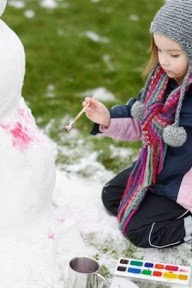
Activity 1: Paint a masterpiece on the snow
Ideal for age:
Three and up
The outdoor winter activity in a nutshell:
Painting a landscape takes on a new meaning! Forget the paper and the canvas — this activity lets children paint directly on the actual snow.
What you will need:
- A snowy terrain
- Food coloring in (at least) the three primary colors: red, blue, and yellow
- A small spray bottle for each child or small bowls
- Paintbrushes
How to do it:
Children might prefer to spray the paint onto the snow — in this case, simply mix some food colouring and water and fill a spray bottle. For the children that prefer paintbrushes, mix a few drops of food colouring into a small mixing bowl — a stronger mix will make a deeper colour. With your palette prepared, get out into the snow and paint your masterpiece!
Image credit: Money crashes
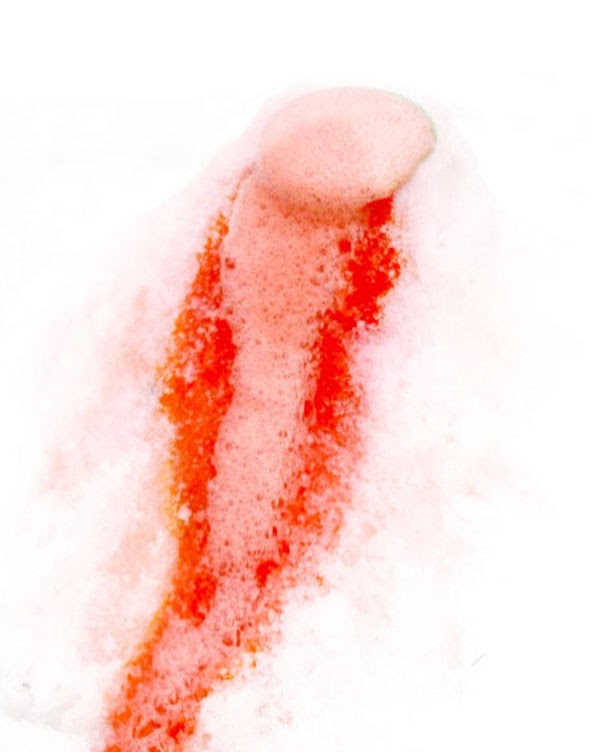
Activity 2: Create an outdoor snow volcano
Ideal for age:
Three and up
The outdoor winter activity in a nutshell:
A bright red explosion out in the snow in the middle of winter will thrill children. Don’t worry, it’s not hot for real. This snowy volcano is perfectly safe, bubbly, and dramatic enough to amaze every little scientist.
What you will need:
- A cup or plastic bottle
- Baking soda
- Vinegar
- Food colouring
How to do it:
To form the snow volcano, take a plastic cup and set it on the ground in the snow. Pile snow up around the sides of the cup, packing it down into a solid snowy volcano shape. Once you have your volcano, the children can add baking soda and food colouring to the cup at the core of the volcano. Ready for the fun part? Just add some vinegar into the cup, and watch as the red foamy “lava” comes flowing out.
Source: Growing a jeweled rose
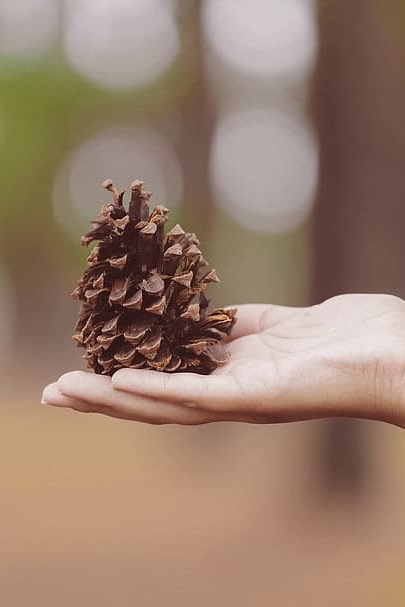
Activity 3: Build a nature treasure table
Ideal for age:
Two and up
The outdoor winter activity in a nutshell:
By gathering some of the natural materials outdoors, children can display their treasures and build a visual display of how the world outside changes throughout the year. Part scavenger hunt, part art project, all fun!
What you will need:
- A display table and tablecloth
- A basket for gathering your natural items
- The items you can find outdoors like brown leaves, pinecones and feathers
How to do it:
Enjoy an outdoor walk in nature, and ask your children to collect the most beautiful nature treasures that catch their eye. Back at home or in the classroom, spread the tablecloth out and invite the children to set out their treasures to create a scene. Let the children determine how to set this up — maybe it’s an artistic scene, maybe they find a pattern for organising it all. Encourage the children to note the different colours they see in the natural items, and how they differ from the colours in other seasons.
Source: www.plt.org

Activity 4: Have a nature clean-up session
Ideal for age:
All ages
The outdoor winter activity in a nutshell:
Cleaning up the local environment and while enjoying the fresh winter air. This winter activity is rewarding, straightforward and helps children learn to care for the world around them. Include a tasty treat as a reward at the end, and you’ll have no problem bringing children out for more!
What you will need:
- A bag or a basket for the trash collected
- Gloves or a poker stick for icky bits of trash
- Cocoa or a hot drink of your choice to finish off the activity
How to do it:
Collecting litter and cleaning up isn’t always fun — unless you turn it into a competition that’s incentivised with a cup of hot cocoa at the end. See who can collect the most items of trash, but keep it relaxed and fun. Once you’re back home, everyone gets a high-five and enjoys a warm drink.
Source: Dogo news
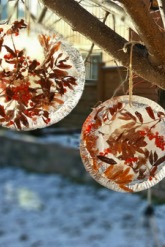
Activity 5: Make frozen overnight art
Ideal for age:
Three and up
The outdoor winter activity in a nutshell:
Winter art that’s eco-friendly. Plus, this activity can start a wonderful conversation with children about how we can find water as a liquid, a solid (ice) and gas (steam and vapour) in our world.
What you will need:
- Shaped containers for freezing water
- Natural elements (twigs, leaves, berries, pine cones)
- Water
- Something to hang your ornaments, like twine, yarn or ribbon
- Freezer space or freezing temperatures
How to do it:
Make sure your container will fit into your freezer — it doesn’t have to be large. Whether you collect them outside or have them on hand, start by placing your natural elements in the freezing container. You can arrange them to form a pattern or or a scene if you want to make it more decorative. Then, add a few centimetres of water to submerged your treasures. Place both ends of your twine, yard or ribbon at least three centimeters into the water, allowing the loop to stick out. Now, pop your container into the freezer.
Once the ice is fully set, remove it from the container — you’ll have a glittering, icy prism full of natural treasures, perfect for outdoor decorating. Use the loop to hang your ice art in a tree or outside a window.
Source: Take them outside

Activity 6: Take in the winter skies with stargazing
Ideal for age:
Five and up
The outdoor winter activity in a nutshell:
The night sky invites so many questions. Spend a memorable evening looking at shooting stars, sipping hot cocoa, and touching on the facts of the universe.
What you will need:
- A telescope
- A clear night sky
- Hot cocoa
- Google, for looking up those tricky questions children might have
How to do it:
Perch at a window or visit a park that’s safe for night-time walkers. Bring a telescope, and an insulated container of a warm treat like tea or cocoa to share as you gaze at the stars. You can use this time to bring up all sorts of questions about our big world: Gravity, the moon and how it affects ocean tides on Earth, the planets and their rotation around the sun, the sun and the role it plays in our changing seasons.
Source: Sitters
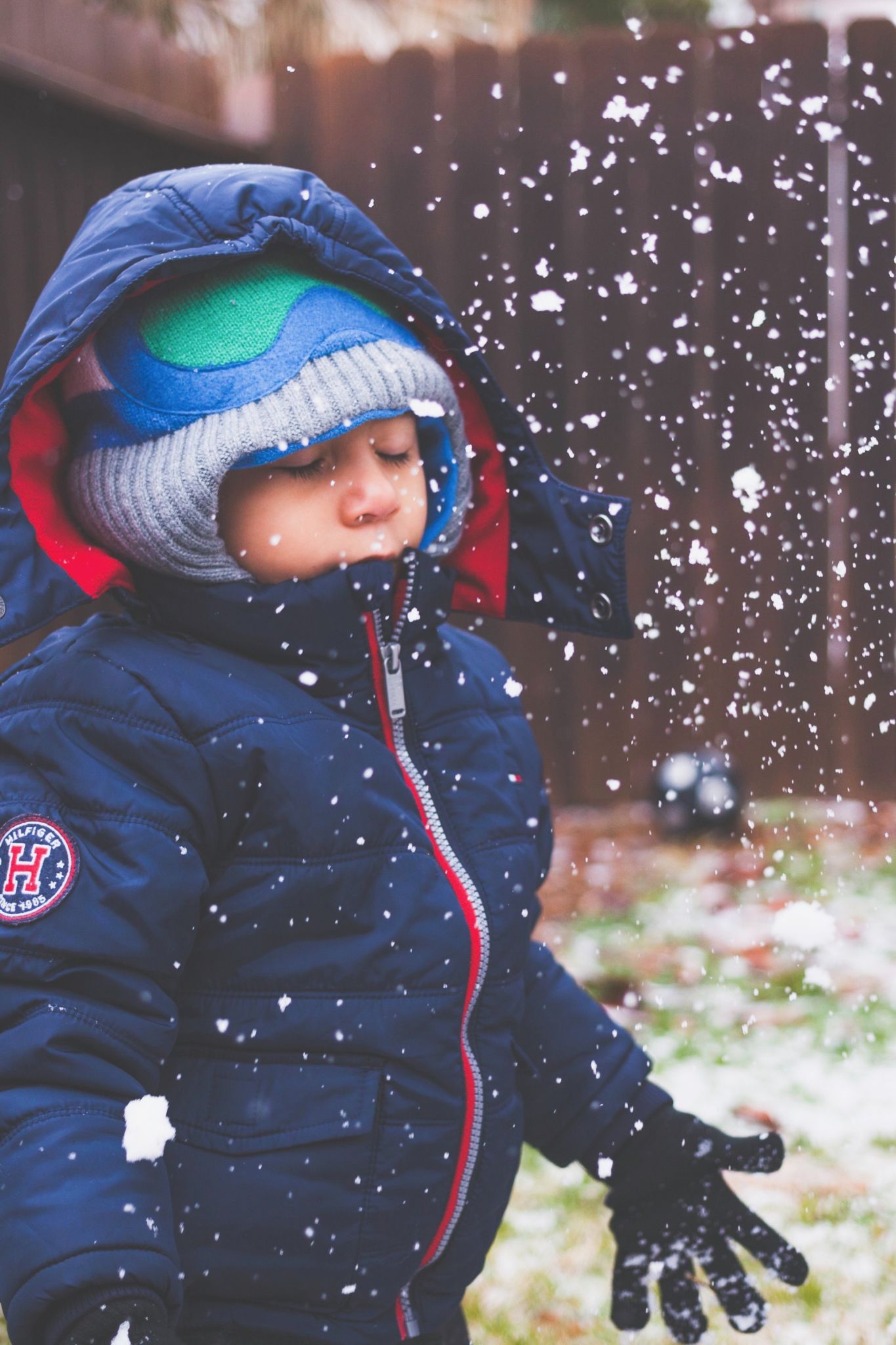
Activity 7: Go on a wintry colour hunt
Ideal for age:
Three and up
The outdoor winter activity in a nutshell:
A colour hunt in the summertime is easy, because it’s quick to spot the colours on the buzzing bugs and blooming flowers. But in the wintertime it’s an exciting new challenge — children have to use their eagle-eyes to spot colours in the natural landscape.
What you will need:
- Cardboard
- Contact paper (sticky-back plastic)
- Something to colour the cardboard.
- Somewhere to play
How to do it:
Provide children with a paint card or create your own using crayons, so they know what hues to look for in the landscape. All bundled up and with colour card in hand, accompany your children out into the world to find as many treasures as they can that match the colors on their cards. Walk with them as they explore, and perhaps give a nudge here and there by pausing near a colourful object to check off on the card.
Source: Inspire my play
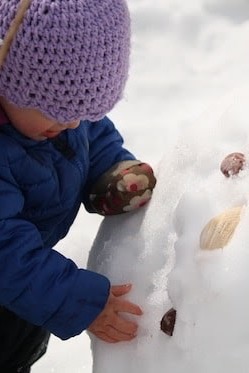
Activity 8: Sticks, stones, and snow
Ideal for age:
Two and up
The outdoor winter activity in a nutshell:
Invite little hands to make the most of the snowy white world by prodding, poking and decorating a big ball of snow with natural materials. Think of it like a modern take on the snowman!
What you will need:
- A snowy terrain, with enough snow to roll up a big snowball
- Natural items like sticks, pebbles and shells
How to do it:
Start out by collecting the snow around you, and rolling or piling it into a ball. It doesn’t need to be perfect, it just needs to be tall and clumped together, the fresh canvas for your wintertime art. Introduce a basket of natural materials including sticks, pebbles and shells to the little ones — with natural materials, it’s no problem if some get lost in the snow. Show them how they can decorate the ball of snow, or simply enjoy the sensation of pushing items into the snow.
Source: Happy hooligans
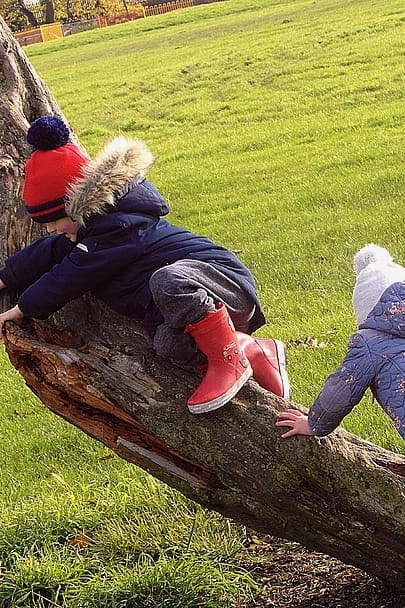
Activity 9: Adopt a snowy tree
Ideal for age:
1-4 years
The outdoor winter activity in a nutshell:
Find a tree in a public space, and become its friend and guardian for the winter by visiting and caring for it.
What you will need:
- Warm clothes for venturing outdoors in winter
- A tree in a safe area where children can climb and play
How to do it:
Often, children are naturally inclined to connect with particular features of their surroundings, like a certains swingset or a special tree — so visit a park in your neighbourhood and find a tree to adopt. Observe the tree on a regular basis, and encourage the children to notice the smaller details by asking questions like:
- How is the tree similar or different from the ones around it?
- How does the tree help the environment?
- Is the tree alive? How do you know?
This helps teach children simple science lessons, and builds an idea of how we can care for the natural world around us.
Source: www.plt.org
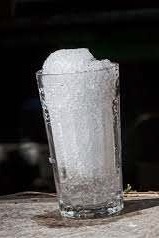
Activity 10: Experiment with melting snow
Ideal for age:
Three and up
The outdoor winter activity in a nutshell:
This is one of the easiest winter experiments, and it’s got some of the clearest results — so it’s great for the beginner scientist. It’s a beautifully simple way to demonstrate how temperature can change the form of water. That might be familiar waters for us, but for young children, it’s a fascinating phenomenon.
What you will need:
- Three cups per child participating
- Snow
- Room temperature water
- Warm water
- Cold water
How to do it:
Each child should go out and scoop up some snow with their three cups, ensuring they’re filled to the top. Place your glasses on a table, or in the snow if you’re staying outside. Then, get cold water, room temperature water and warm water. One at a time, allow children to pour a bit of the different temperatures of water in each cup — as you do so, help them notice how each cup of snow melts and behaves differently. This experiment is a great way to start a conversation about temperatures and how they affect water.
Source: www.plt.org
The big ideas
Please note: here at Famly we love sharing creative activities for you to try with the children at your setting, but you know them best. Take the time to consider adaptions you might need to make so these activities are accessible and developmentally appropriate for the children you work with. Just as you ordinarily would, conduct risk assessments for your children and your setting before undertaking new activities, and ensure you and your staff are following your own health and safety guidelines.
Get 1000s of free EY activities
Want over 7,000 activities? See them in a free 14-day trial. Filter to target learning areas, age groups and topics, and get inspired.
Get started







